Else Bassermann, née Elisabeth Sara Schiff (1878-1961) was a German stage and screen actress. In 1908 she married renowned stage actor Albert Bassermann and often performed together with him on stage. When he started to play in film, she accompanied him there too. She also wrote several scripts for his silent films.
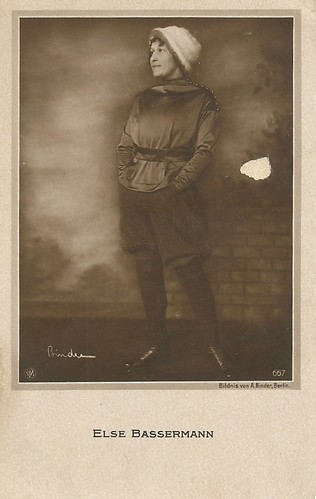
German postcard by NPG (Neue Photographische Gesellschaft), no. 667. Photo: Alex Binder, Berlin.
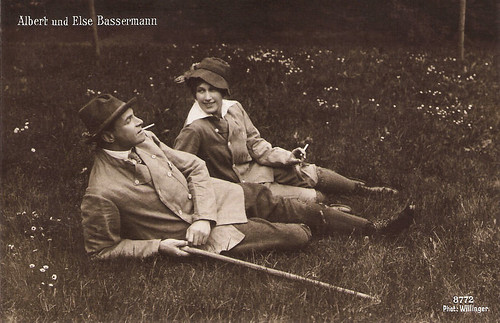
German postcard, no. 8772. Photo: Willinger. Albert and Else Bassermann.
Else Bassermann was born Elisabeth Sara Schiff in 1878 in Leipzig, Germany.
Else made her stage debut at the Köln Residenztheater in 1902. One year later she acted in Nuremberg before she went to Berlin in 1904, among others working at the Lessingtheater and for Max Reinhardt.
In 1908, Else married renowned stage actor Albert Bassermann and she often performed together with him on stage. When her husband started to play in film, she accompanied him, as in Der letzte Tag/The Last Day (Max Mack, 1913), ptoduced by the Vitascope company.
Under the pseudonym of Hans Hennings she wrote the scripts for several of her husband's films in the period 1917-1921, which were produced by Jules Greenbaum. She also had substantial supporting parts in them. Examples are Herr und Diener/Master and Servant (Adolf Gärtner, 1917), Du sollst keine andern Götter haben/Thou shalt have no other gods (Adolf Gärtner, 1917), and Dr. Schotte (William Wauer, 1918). The latter was found many decades later in the Desmet Collection at Eye Filmmuseum in Amsterdam.
During the 1920s, she only occasionally acted in films, mostly in bit parts in films in which her husband had major parts. Meanwhile they both continued to act on stage with great success.
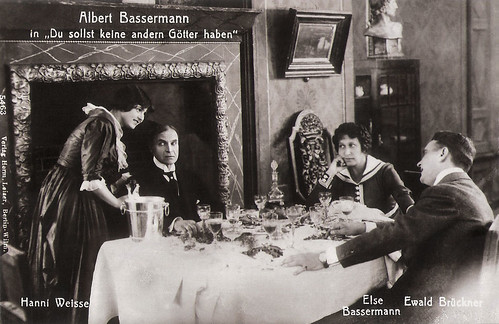
German postcard by Verlag Hermann Leiser, Berlin-Wilm., no. 5463. Photo: publicity still for Du sollst keine andern Götter haben/Thou shalt have no other gods (Adolf Gärtner, 1917) with Hanni Weisse, Albert Bassermann, Else Bassermann and Ewald Brückner.

German postcard by Verlag Hermann Leiser, Berlin, no. 5465. Photo: Greenbaum-Film. Albert Bassermann in a dual role in the German silent film Herr und Diener (Adolf Gärtner, 1917). A reputed professor (Albert Bassermann) hires a servant (also Bassermann) for a world trip. The servant is his spitting image. When the professor is lamed, the servant trades places with him. Nobody discovers the fraud, till one day the professor's maid (Else Bassermann) unmasks the culprit. The script was written by Else Basssermann under the pseudonym of Hans Hennings. On this postcard Else Bassermann can be seen on the extreme right.
In 1934 the Jewish Else Bassermann was forbidden to continue acting on stage in Germany. The couple Bassermann moved to Austria and from there, in 1939 to the USA.
In Hollywood they were employed by Warner but could make very few films. Albert could only play a few supporting parts, such as in Alfred Hitchcock's Foreign Correspondent (1940). Else also played a supporting part in Madame Curie (Mervyn LeRoy, 1943), featuring Greer Garson, and in I Was a Criminal (Richard Oswald, 1945).
Albert Bassermann's lack of mastering the English language no doubt was an obstacle. After the war the couple returned to Europe to act on stage again, in Germany as of 1949. She did no longer take part in films.
After Albert died during a flight in a plane in 1952, Else continued to act but her career went downhill, and so went her finances. In the end she even had to give up her house, and move in with a crippled lady, together with her mentally handicapped daughter Carmen.
Else Bassermann died poor and destitute 1961 in Baden-Baden, Germany. She was 83. Her daughter died in 1971 in a traffic accident.
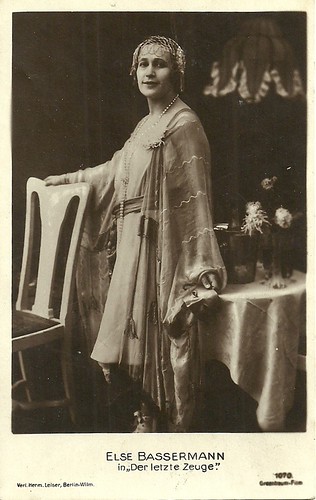
German postcard by Verlag Herman Leiser, no. 1070. Photo: Greenbaum-Film. Publicity still of Else Bassermann in Der letzte Zeuge (Adolf Gärtner, 1919).
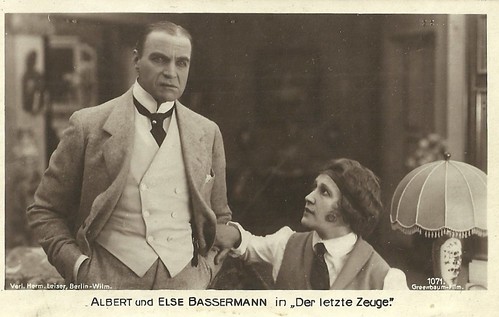
German postcard by Verlag Herman Leiser, no. 1071. Photo: Greenbaum-Film. Publicity still of Albert Bassermann and Else Bassermann in Der letzte Zeuge (Adolf Gärtner, 1919).
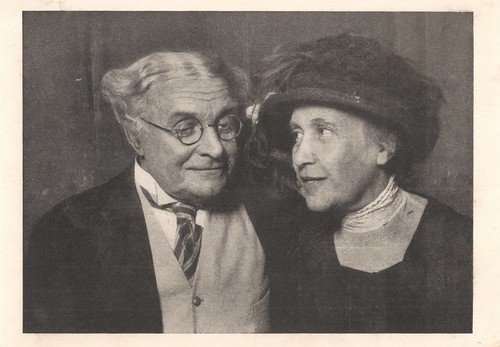
German postcard. Publicity card for Albert and Else Bassermann in the play Groszstadtluft in the Berlin theatre Scala.
Sources: Filmportal.de (German), Wikipedia (German) and IMDb.

German postcard by NPG (Neue Photographische Gesellschaft), no. 667. Photo: Alex Binder, Berlin.

German postcard, no. 8772. Photo: Willinger. Albert and Else Bassermann.
Actress, Script-writer, Wife
Else Bassermann was born Elisabeth Sara Schiff in 1878 in Leipzig, Germany.
Else made her stage debut at the Köln Residenztheater in 1902. One year later she acted in Nuremberg before she went to Berlin in 1904, among others working at the Lessingtheater and for Max Reinhardt.
In 1908, Else married renowned stage actor Albert Bassermann and she often performed together with him on stage. When her husband started to play in film, she accompanied him, as in Der letzte Tag/The Last Day (Max Mack, 1913), ptoduced by the Vitascope company.
Under the pseudonym of Hans Hennings she wrote the scripts for several of her husband's films in the period 1917-1921, which were produced by Jules Greenbaum. She also had substantial supporting parts in them. Examples are Herr und Diener/Master and Servant (Adolf Gärtner, 1917), Du sollst keine andern Götter haben/Thou shalt have no other gods (Adolf Gärtner, 1917), and Dr. Schotte (William Wauer, 1918). The latter was found many decades later in the Desmet Collection at Eye Filmmuseum in Amsterdam.
During the 1920s, she only occasionally acted in films, mostly in bit parts in films in which her husband had major parts. Meanwhile they both continued to act on stage with great success.

German postcard by Verlag Hermann Leiser, Berlin-Wilm., no. 5463. Photo: publicity still for Du sollst keine andern Götter haben/Thou shalt have no other gods (Adolf Gärtner, 1917) with Hanni Weisse, Albert Bassermann, Else Bassermann and Ewald Brückner.

German postcard by Verlag Hermann Leiser, Berlin, no. 5465. Photo: Greenbaum-Film. Albert Bassermann in a dual role in the German silent film Herr und Diener (Adolf Gärtner, 1917). A reputed professor (Albert Bassermann) hires a servant (also Bassermann) for a world trip. The servant is his spitting image. When the professor is lamed, the servant trades places with him. Nobody discovers the fraud, till one day the professor's maid (Else Bassermann) unmasks the culprit. The script was written by Else Basssermann under the pseudonym of Hans Hennings. On this postcard Else Bassermann can be seen on the extreme right.
Alfred Hitchcock
In 1934 the Jewish Else Bassermann was forbidden to continue acting on stage in Germany. The couple Bassermann moved to Austria and from there, in 1939 to the USA.
In Hollywood they were employed by Warner but could make very few films. Albert could only play a few supporting parts, such as in Alfred Hitchcock's Foreign Correspondent (1940). Else also played a supporting part in Madame Curie (Mervyn LeRoy, 1943), featuring Greer Garson, and in I Was a Criminal (Richard Oswald, 1945).
Albert Bassermann's lack of mastering the English language no doubt was an obstacle. After the war the couple returned to Europe to act on stage again, in Germany as of 1949. She did no longer take part in films.
After Albert died during a flight in a plane in 1952, Else continued to act but her career went downhill, and so went her finances. In the end she even had to give up her house, and move in with a crippled lady, together with her mentally handicapped daughter Carmen.
Else Bassermann died poor and destitute 1961 in Baden-Baden, Germany. She was 83. Her daughter died in 1971 in a traffic accident.

German postcard by Verlag Herman Leiser, no. 1070. Photo: Greenbaum-Film. Publicity still of Else Bassermann in Der letzte Zeuge (Adolf Gärtner, 1919).

German postcard by Verlag Herman Leiser, no. 1071. Photo: Greenbaum-Film. Publicity still of Albert Bassermann and Else Bassermann in Der letzte Zeuge (Adolf Gärtner, 1919).

German postcard. Publicity card for Albert and Else Bassermann in the play Groszstadtluft in the Berlin theatre Scala.
Sources: Filmportal.de (German), Wikipedia (German) and IMDb.
No comments:
Post a Comment